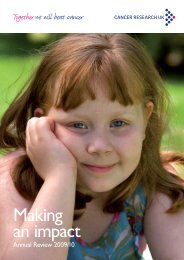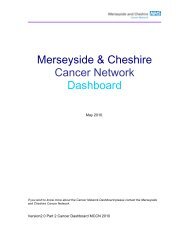Cancer Research UK Annual Review 2011/12
Cancer Research UK Annual Review 2011/12
Cancer Research UK Annual Review 2011/12
Create successful ePaper yourself
Turn your PDF publications into a flip-book with our unique Google optimized e-Paper software.
Beating cancer<br />
together<br />
Our <strong>Annual</strong> <strong>Review</strong><br />
Stories from scientists, survivors, doctors and supporters<br />
<strong>2011</strong>/<strong>12</strong>
Contents<br />
<strong>Cancer</strong> <strong>Research</strong> <strong>UK</strong> is pioneering life-saving research<br />
to bring forward the day when all cancers are cured.<br />
Survival rates have doubled in the past 40 years and<br />
we've been at the heart of this progress. But we can’t<br />
stop there. Every two minutes someone is diagnosed<br />
with cancer. With the help of our supporters we<br />
can accelerate our impact on this devastating disease<br />
– with every pound, every hour and every person,<br />
creating more tomorrows.<br />
02 About us<br />
04 Funding research across the <strong>UK</strong><br />
Our scientists<br />
08 Rising to the challenge of personalising treatment<br />
10 Nilesh's story<br />
<strong>12</strong> Breast cancer breakthrough<br />
14 Preventing cancer: stacking the odds in your favour<br />
16 Switching on the immune system<br />
17 Shaping the future of cancer research<br />
Our survivors<br />
20 Campaigning for life-saving radiotherapy<br />
22 Helping more women survive ovarian cancer<br />
24 R UV UGLY<br />
26 Giving you space to talk about cancer<br />
Our doctors<br />
30 The sponge that could help prevent cancer<br />
32 Beating brain tumours<br />
34 Improving early diagnosis<br />
36 Boosting research into rare cancers<br />
Our supporters<br />
40 The answer is plain<br />
42 Helping Harry Help Others<br />
44 Tesco: sharing our vision to beat cancer<br />
46 You can… climb a mountain for cancer research<br />
47 Carrying the torch for cancer research<br />
Thank you<br />
50 Beating cancer together<br />
52 Kay’s story<br />
1<br />
2<br />
3<br />
4<br />
5<br />
We would like to say thank you to all those who feature within this <strong>Annual</strong> <strong>Review</strong>.<br />
Neve – a leukaemia survivor – and her dad Ian feature on our cover. Read her story on page 2.
<strong>Annual</strong> <strong>Review</strong> <strong>2011</strong>/<strong>12</strong> | 1<br />
Welcome to our review of the year<br />
More people are beating cancer than ever<br />
before thanks to exciting advances in treatments<br />
and technologies.<br />
Our scientists discovered a new way to classify<br />
breast cancer, which could revolutionise how<br />
it’s diagnosed and treated.<br />
Our research laid the foundations for three new<br />
cancer drugs which reached patients this year.<br />
Abiraterone treats advanced prostate cancer.<br />
Vemurafenib and vismodegib treat different<br />
forms of skin cancer.<br />
Prevention and early diagnosis remain priorities.<br />
We carried out a landmark study which showed<br />
more than 40% of cancers could be prevented<br />
by lifestyle changes, including giving up smoking<br />
and healthy eating.<br />
Thank you for<br />
your dedication and<br />
unfailing generosity.<br />
We receive no<br />
government funding<br />
for our research.<br />
Our work is only<br />
possible because<br />
of you. We have<br />
a great deal<br />
more to do, but<br />
together we are<br />
beating cancer.<br />
We also launched a trial of a new test –<br />
‘Cytosponge’ – to detect the early signs of<br />
oesophageal cancer and prevent the disease<br />
in people who are most at risk.<br />
Smoking remains the largest preventable cause<br />
of cancer. Around 80% of smokers start before<br />
they turn 19. We’re calling on the Government<br />
to remove glitzy branding from cigarette packs<br />
that can lure children, giving them one less reason<br />
to start.<br />
However, significant challenges lie ahead. The<br />
number of people diagnosed with cancer in the<br />
<strong>UK</strong> is set to rise steeply by 2030. With increased<br />
support, we could save more lives sooner.<br />
Michael Pragnell,<br />
Chairman<br />
30 May 20<strong>12</strong><br />
Harpal S Kumar,<br />
Chief Executive<br />
30 May 20<strong>12</strong><br />
cancerresearchuk.org
2 | About us<br />
About us<br />
Every two minutes someone is told<br />
they have cancer. As the population<br />
grows and ages, the number of cases<br />
continues to rise.<br />
We want to create more<br />
tomorrows for more people and<br />
we’re determined to keep pushing<br />
forward in our fight against cancer.<br />
Our scientists, doctors and nurses<br />
continue to bring better treatments<br />
to people with cancer. And we’re<br />
working hard to prevent the<br />
disease and diagnose it as early<br />
as possible, when it can be treated<br />
more effectively.<br />
Today more people are beating<br />
cancer than ever before. People<br />
with breast, bowel and ovarian<br />
cancers and non-Hodgkin<br />
lymphoma are twice as likely to<br />
survive for at least 10 years as<br />
those diagnosed in the early 1970s.<br />
And survival rates for leukaemia<br />
have quadrupled. We’ve been<br />
at the heart of this progress.<br />
But with over 200 different types<br />
of cancer there’s still so much more<br />
we need to do – particularly for<br />
harder to treat cancers such as lung,<br />
pancreatic and oesophageal cancer.<br />
In this <strong>Annual</strong> <strong>Review</strong> we share<br />
some amazing stories with you –<br />
told by our scientists, doctors and<br />
supporters, and by cancer survivors.<br />
We receive no government funding<br />
for our research – it’s only possible<br />
because of all of these people who<br />
come together to beat cancer.<br />
Neve’s story<br />
‘It’s terrible to see your child go<br />
through cancer, but you have to<br />
stay strong. Neve was only two<br />
when she was diagnosed with<br />
leukaemia. She had two years<br />
of chemotherapy, followed by<br />
radiotherapy and a stem cell<br />
transplant.<br />
She’s doing great now and we<br />
feel incredibly lucky to have her.<br />
Without <strong>Cancer</strong> <strong>Research</strong> <strong>UK</strong>’s<br />
continued work there wouldn’t<br />
be these successful treatments.<br />
If we’re to beat cancer, we<br />
need everyone’s generosity and<br />
support. It will make a difference.’<br />
Tracey Francis, Neve’s mum.<br />
Around 40,000 volunteers give up their time to support us.
<strong>Annual</strong> <strong>Review</strong> <strong>2011</strong>/<strong>12</strong> | 3<br />
Neve Francis, 7, from Wolverhampton<br />
cancerresearchuk.org
4 | Funding research across the <strong>UK</strong><br />
Funding research<br />
across the <strong>UK</strong><br />
2<br />
1<br />
Across the <strong>UK</strong> scientists,<br />
survivors, doctors and supporters<br />
are helping us beat cancer.<br />
4<br />
5<br />
3<br />
6<br />
7<br />
9<br />
8<br />
10<br />
Cardiff (9)<br />
We fund the Wales<br />
<strong>Cancer</strong> Trials Unit,<br />
where Gareth Griffiths<br />
and his team help to<br />
run trials across the<br />
country – including the<br />
world’s largest lung<br />
cancer trial.<br />
Northern Ireland (4)<br />
We’re helping support<br />
five research nurses<br />
based at the hospitals<br />
in Altnagelvin, Antrim,<br />
Belfast, Craigavon and<br />
Dundonald, to raise<br />
awareness of trials<br />
and care for people<br />
taking part.<br />
Manchester (5)<br />
We’re creating a new<br />
state-of-the-art research<br />
facility – the Manchester<br />
<strong>Cancer</strong> <strong>Research</strong> Centre<br />
building – to boost the<br />
city’s pioneering research<br />
into personalised cancer<br />
treatments.<br />
Plymouth (10)<br />
People in Plymouth<br />
are taking part in a<br />
trial testing whether<br />
a new drug called<br />
celecoxib can improve<br />
the treatment of<br />
bladder cancer.
<strong>Annual</strong> <strong>Review</strong> <strong>2011</strong>/<strong>12</strong> | 5<br />
Stirling (2)<br />
Work by Professor Gerard Hastings<br />
and his team in Stirling is helping<br />
to find ways to reduce smoking<br />
rates and cut the number of people<br />
with lung cancer and other cancers<br />
caused by smoking.<br />
Sheffield (6)<br />
Led by Professor<br />
Rob Coleman,<br />
research at the new<br />
Sheffield Centre will<br />
have a strong focus<br />
on cancers affecting<br />
the bones.<br />
Aberdeen (1)<br />
Men in Aberdeen<br />
with a family history<br />
of prostate cancer<br />
are taking part in a<br />
study investigating<br />
targeted screening<br />
for the disease, which<br />
could diagnose it<br />
earlier and save lives.<br />
Newcastle (3)<br />
Dr Josef Vormoor<br />
in Newcastle<br />
is investigating<br />
molecules that fuel<br />
acute lymphoblastic<br />
leukaemia, the most<br />
common type of<br />
childhood cancer.<br />
Norwich (7)<br />
People in Norwich<br />
are taking part in<br />
a trial to find out<br />
which combination<br />
of chemotherapy<br />
drugs given after<br />
surgery will best<br />
improve survival<br />
for people with<br />
pancreatic cancer.<br />
London (8)<br />
More than 9,000 men and<br />
women took part in Shine<br />
London, our night-time<br />
walking marathon, where each<br />
participant raises funds for a<br />
particular type of cancer that’s<br />
close to their heart.
1Our scientists<br />
are finding<br />
the answers<br />
Using their expertise<br />
and the latest technologies,<br />
our scientists are making<br />
life-saving discoveries.<br />
Working in many areas<br />
of research, from biology<br />
to maths, together they<br />
lead the world in the fight<br />
against cancer.<br />
Dr Julie Cooper,<br />
at our London <strong>Research</strong> Institute.
8 | Our scientists are finding the answers<br />
Rising to the challenge of<br />
personalising treatment<br />
Why do cancer drugs work for some people<br />
but not others Why do they sometimes stop<br />
working Why is cancer so difficult to cure after<br />
it has spread How can we develop better tests<br />
that predict how it will progress Our scientists<br />
are working hard to answer these questions.<br />
We know our<br />
enemy better<br />
now, but we still<br />
have a lot more<br />
work to do.<br />
Professor<br />
Charlie Swanton<br />
A major study by Professor Charlie Swanton,<br />
at our London <strong>Research</strong> Institute, has revealed<br />
more about how tumours develop and change<br />
over time. His findings have big implications for the<br />
way we understand cancer. We want to harness<br />
this knowledge to develop better treatments and<br />
personalise them for each patient.<br />
Cutting-edge study<br />
Professor Swanton led a three-year study analysing<br />
the DNA from a series of kidney cancer tissue<br />
samples. Using state-of-the-art technology,<br />
his team of scientists looked in unprecedented<br />
detail at different parts of patients’ tumours and<br />
how they relate to each other.<br />
We care about every cancer patient – that’s why we’re investing in new ways to tailor treatment.
<strong>Annual</strong> <strong>Review</strong> <strong>2011</strong>/<strong>12</strong> | 9<br />
They also investigated how primary tumours relate<br />
to secondary ones – the primary tumour is where<br />
the cancer started; a secondary tumour is where it<br />
has spread to.<br />
The scientists revealed that no two samples were<br />
identical – even those taken from right next to<br />
each other in the original tumour. This discovery<br />
showed how cancer changes and adapts as it grows<br />
and spreads. These results help explain why it’s<br />
difficult to predict which treatment will work, and<br />
why some treatments become less effective later<br />
on as the patient’s disease changes.<br />
‘One way of looking at it is to see the tumour as<br />
a tree,’ says Professor Swanton. ‘You have genetic<br />
faults that are in the trunk and present in every<br />
part of the tumour. Then you have the faults in<br />
the branches that may differ from one part of the<br />
tumour to the next.’<br />
‘Identifying these widespread faults is key to<br />
improving treatments. This is because an increasing<br />
number of cancer drugs work by targeting genetic<br />
faults. If you target one that’s present in one part of<br />
the tumour and not the other, the treatment won’t<br />
be as effective.<br />
The next stage is to identify which faults inside each<br />
tumour are driving the disease, as this will improve<br />
the success of these tailored treatments.’<br />
cancerresearchuk.org
10 | Our scientists are finding the answers<br />
Nilesh’s story<br />
When Nilesh Jhala had a tickly cough that he<br />
just couldn’t shake, he decided to see a specialist.<br />
‘That cough was a blessing,’ says the father of two<br />
from Bedfordshire. ‘It prompted the check-ups<br />
that found the cancer.’<br />
Nilesh was diagnosed with kidney cancer in March<br />
<strong>2011</strong>. The cough had been totally unrelated. ‘What<br />
scared me most was when the specialist confirmed<br />
that I’d had the tumour for about four or five years,<br />
judging by the size of it. So catching it when we did<br />
was critical,’ he says.<br />
Three weeks later, Nilesh had his kidney removed.<br />
He agreed that samples could be used for research,<br />
helping studies like Professor Swanton’s. Nilesh is<br />
also on a trial that we're co-funding, to find out if<br />
the drug sorafenib, taken after surgery, can help to<br />
stop or delay kidney cancer coming back.<br />
I was pleased that<br />
I could help with<br />
research and take<br />
part in this trial.<br />
It’s something I can<br />
do to help others.<br />
Getting the right<br />
treatment for the<br />
right patient is<br />
essential – it could<br />
save many lives.<br />
Nilesh Jhala<br />
We support almost 250 cancer trials, with over 30,000 volunteers taking part every year.
<strong>Annual</strong> <strong>Review</strong> <strong>2011</strong>/<strong>12</strong> | 11<br />
Nilesh Jhala, 49, from Bedfordshire<br />
cancerresearchuk.org
<strong>12</strong> | Our scientists are finding the answers<br />
Lorraine Hill, 54, from South Wales<br />
Breast cancer<br />
breakthrough<br />
Thousands of women in the<br />
<strong>UK</strong> today survive breast cancer<br />
thanks to advances in research<br />
– we’ve been at the heart of this<br />
progress. This year, our scientists<br />
conducted a landmark study<br />
that will completely change the<br />
way we look at breast cancer.<br />
Professor Carlos Caldas explains<br />
what the results could mean for the<br />
future of breast cancer treatment.<br />
What did your team do<br />
‘Currently, doctors examine<br />
breast tumour samples under a<br />
microscope and classify the disease<br />
according to the type of cells we find,<br />
as well as testing for the presence<br />
of specific molecules. This approach<br />
guides decisions about a patient’s<br />
treatment and has saved many lives.<br />
But it doesn’t always predict how<br />
a tumour will respond to particular<br />
treatments.<br />
In our new study, we used<br />
sophisticated equipment, currently<br />
beyond the scope of today’s hospital<br />
labs, to delve deeper and analyse the<br />
genetic fingerprints of 2,000 breast<br />
tumour samples.<br />
Almost two-thirds of women diagnosed with breast cancer now survive beyond 20 years.
<strong>Annual</strong> <strong>Review</strong> <strong>2011</strong>/<strong>12</strong> | 13<br />
Each tumour has its own individual<br />
story, written within its genetic faults.<br />
But only a few of those faults fuel its<br />
growth and spotting these “drivers”<br />
is extremely difficult.’<br />
What did you discover<br />
‘We discovered 10 different<br />
subtypes of breast cancer, identifying<br />
several genes that make tumours<br />
grow. Our research has found a way<br />
to reclassify breast cancer, showing<br />
that there are many more forms of<br />
the disease than had been described<br />
before.’<br />
How will this improve<br />
diagnosis and treatment<br />
for people with breast cancer<br />
‘This research could revolutionise the<br />
way women with breast cancer are<br />
diagnosed and treated in the future,<br />
particularly for certain types of breast<br />
tumours that are hard to tackle.<br />
Knowing what type of<br />
breast cancer I had helped<br />
doctors choose the right<br />
treatment for me. I didn’t lose<br />
my hair or feel as sick as I<br />
did the first time I had breast<br />
cancer. I hope this important<br />
study will mean that more<br />
women will get more specific<br />
treatment and experience<br />
fewer side effects.<br />
Lorraine Hill took part in a trial<br />
we funded to improve breast<br />
cancer treatment.<br />
Our work will help doctors more<br />
accurately predict a tumour’s<br />
response to treatment, and whether<br />
it’s likely to spread to other parts<br />
of the body or return. This means<br />
more women will benefit from drugs<br />
that are tailored to their specific<br />
breast cancer.<br />
We now need to carry out more<br />
research to find out how each<br />
tumour subtype behaves so we can<br />
decide on the best way to tackle<br />
each of the 10 types of breast cancer.’<br />
cancerresearchuk.org
14 | Our scientists are finding the answers<br />
Preventing cancer:<br />
stacking the odds in your favour<br />
More people are surviving cancer<br />
than ever before, largely because of<br />
better tests and treatments. But this<br />
is just one part of our fight against<br />
the disease. Prevention really is<br />
better than cure.<br />
A person’s chance of developing<br />
cancer depends on a mix of their<br />
genes, the environments they<br />
are exposed to and their lifestyle<br />
choices. It’s vital that we continue<br />
to investigate how lifestyles<br />
affect cancer risk so that we can<br />
improve awareness, help people<br />
make healthy choices and find<br />
new ways to prevent the disease.<br />
This is why we carried out the most<br />
comprehensive study of cancer and<br />
lifestyle to date. Its results showed<br />
that more than 100,000 cancers<br />
diagnosed in the <strong>UK</strong> each year are<br />
caused by smoking, unhealthy diets,<br />
excess weight and alcohol.<br />
Professor Max Parkin, based at<br />
Queen Mary, University of London,<br />
led this work. Here he gives some<br />
insights from this research.<br />
‘Many people believe cancer is down<br />
to fate. But looking at the evidence,<br />
it’s clear that around four in 10<br />
cancers are caused by things we<br />
mostly have the power to change.<br />
<strong>Cancer</strong> risk can be affected by family<br />
history and getting older, but these<br />
figures show that we can take steps<br />
to help reduce our risk of developing<br />
the disease.<br />
We didn’t expect<br />
to find that among<br />
women being overweight<br />
has a greater effect than<br />
alcohol. Or that eating<br />
fruit and vegetables<br />
would prove to be so<br />
important in protecting<br />
men against cancer.<br />
Professor Max Parkin<br />
Although leading a healthy lifestyle<br />
doesn’t guarantee that a person<br />
won’t get cancer, these results show<br />
that healthy habits can significantly<br />
stack the odds in our favour. This is<br />
vital information that could help save<br />
more lives in future.’<br />
Our work on the causes and prevention of cancer has saved millions of lives across the world.
<strong>Annual</strong> <strong>Review</strong> <strong>2011</strong>/<strong>12</strong> | 15<br />
More than 100,000 cancers are caused by smoking, unhealthy diets,<br />
excess weight and alcohol each year in the <strong>UK</strong><br />
60,000<br />
Smoking<br />
Smoking is the biggest<br />
preventable cause of cancer.<br />
It causes more than four<br />
in five cases of lung cancer<br />
and increases the risk of<br />
over a dozen other cancers.<br />
<strong>Cancer</strong>s including:<br />
Lung<br />
Oesophageal<br />
Oral<br />
Bladder<br />
Bowel<br />
Pancreatic<br />
29,500<br />
Unhealthy<br />
diet<br />
Diet can influence our risk<br />
of many cancers. You can<br />
reduce the risk by eating a<br />
healthy, balanced diet that<br />
is high in fibre, fruit and<br />
vegetables and low in red<br />
and processed meat and salt.<br />
<strong>Cancer</strong>s including:<br />
Bowel<br />
Oesophageal<br />
Oral<br />
Lung<br />
Stomach<br />
Laryngeal<br />
17,300<br />
Excess<br />
weight<br />
Excess weight can increase<br />
the risk of two of the most<br />
common cancers and three<br />
of the hardest to treat. Most<br />
people are unaware that their<br />
weight can have such a strong<br />
influence on their cancer risk.<br />
<strong>Cancer</strong>s including:<br />
Bowel<br />
Breast<br />
Womb<br />
Kidney<br />
Oesophageal<br />
Pancreatic<br />
<strong>12</strong>,500<br />
Alcohol<br />
Alcohol can cause<br />
many types of cancer,<br />
but only four out of<br />
10 people know that<br />
drinking alcohol increases<br />
the risk of the disease.<br />
<strong>Cancer</strong>s including:<br />
Bowel<br />
Breast<br />
Oral<br />
Oesophageal<br />
Laryngeal<br />
Liver<br />
cancerresearchuk.org<br />
*Some cancers are caused by more than one factor,<br />
so adding these totals will not result in the total number<br />
of cancers caused by all these factors.
16 | Our scientists are finding the answers<br />
Switching on the immune system<br />
The immune system could be our<br />
body’s most powerful weapon<br />
against cancer – but often it needs<br />
a helping hand. Our researchers<br />
are developing ways to harness<br />
it using ‘cancer vaccines’. Instead<br />
of preventing the disease like<br />
conventional vaccines, these<br />
promising treatments are helping<br />
trigger patients’ own immune systems<br />
to target and destroy tumours.<br />
Professor Alan Melcher has high<br />
hopes for this approach. Based at<br />
the <strong>Cancer</strong> <strong>Research</strong> <strong>UK</strong> Centre<br />
at the University of Leeds, he talks<br />
about his work and the complex<br />
challenges he faces.<br />
‘How do you develop a treatment<br />
that stimulates a patient’s immune<br />
system to target cancer without<br />
causing harm elsewhere in the body<br />
This is one of the main problems<br />
my research aims to solve.<br />
Usually, our immune systems aren’t<br />
good at recognising cancer. But they<br />
are extremely good at recognising<br />
and responding to viruses. So we<br />
have genetically engineered viruses<br />
to carry molecules called antigens<br />
that act as a detectable “fingerprint”<br />
of the cancer cells.<br />
The virus smuggles the antigens into<br />
the body. Once injected, the immune<br />
system wakes up, spots the virus and<br />
attacks it. And as it does so, it helps<br />
the immune system to recognise and<br />
attack the tumour.<br />
I’m optimistic about the<br />
results so far, which could<br />
see the cancer vaccine<br />
we’re developing being used<br />
alongside chemotherapy<br />
and radiotherapy in five<br />
to 10 years’ time.<br />
Professor Alan Melcher<br />
In the past, scientists have used only<br />
a few antigens to stimulate the immune<br />
response. What we’ve done is test<br />
a whole library of antigens at once<br />
to find out which ones work best.<br />
We’ve found three that together<br />
stimulate the immune system and<br />
which could be used as the basis<br />
of a vaccine to treat patients.<br />
It’s a really targeted way of treating<br />
cancers, which could help to reduce<br />
side effects and benefit patients.’<br />
Our researchers are pioneering new ways to tackle cancer and save more lives.
<strong>Annual</strong> <strong>Review</strong> <strong>2011</strong>/<strong>12</strong> | 17<br />
Shaping the future of cancer research<br />
One of the most important<br />
developments in <strong>UK</strong> biomedical<br />
science for decades, The Francis<br />
Crick Institute will bring together<br />
the best scientists from across<br />
the world. Their pioneering work<br />
will give us the opportunity to<br />
fight cancer faster than ever before.<br />
Dr Julie Cooper is a researcher<br />
at our London <strong>Research</strong> Institute.<br />
Her team is studying ‘telomeres’,<br />
part of our DNA, which limit the<br />
number of times normal cells can<br />
divide. But in cancer cells telomeres<br />
are faulty and allow the cells to<br />
become ‘immortal’. By finding how<br />
they work, Dr Cooper’s team hopes<br />
to identify new approaches to treat<br />
cancer in the future. She’s excited<br />
about the opportunities to advance<br />
her research at The Crick when it<br />
opens in 2015.<br />
‘Sometimes, meeting someone<br />
who works in a different field to<br />
you – a physicist, perhaps, or a<br />
mathematician – generates new<br />
ideas and unexpected collaborations.<br />
These interactions will happen all<br />
the time at The Crick.<br />
The size and design of the new<br />
institute are key. We’ll have<br />
scientists across a range of disciplines<br />
plus lab designs that help us make<br />
connections, which is great for<br />
expanding your horizons and<br />
driving forward cancer research.<br />
We’ll also have access to the latest<br />
cutting-edge technology and<br />
research facilities that will keep<br />
us at the forefront of our field.<br />
There’s a long tradition of excellent<br />
research and great discoveries at<br />
the London <strong>Research</strong> Institute<br />
– it’s what attracted me to London<br />
from the US. The Crick is going to<br />
build on that excellence. With such<br />
a large, high-profile place, in the<br />
centre of London, we’re going to<br />
attract the best and the brightest<br />
scientists from all around the world.<br />
Together we’ll generate innovative<br />
ideas, and we’ll have the facilities to<br />
carry them through. We hope this<br />
will translate into advances in cancer<br />
research that will save many lives.’<br />
cancerresearchuk.org
2<strong>Cancer</strong><br />
survivors give<br />
hope to others<br />
Living proof of the<br />
incredible progress<br />
we’re making, cancer<br />
survivors inspire<br />
our fundraising and<br />
influence our campaigns.<br />
Their stories motivate<br />
others to join us<br />
and help beat cancer.<br />
Sue Buzzeo, from Newcastle.
20 | <strong>Cancer</strong> survivors give hope to others<br />
Campaigning for life-saving radiotherapy<br />
Relentless altitude sickness. Temperatures of -20º C.<br />
Trekking over rough terrain for 10 hours a day.<br />
John McVey, 48, says his <strong>2011</strong> fundraising trip<br />
to Everest Base Camp pushed him to his limits.<br />
But he rose to the challenge and completed the<br />
trek. ‘Having cancer changed the way I view<br />
things,’ he says. ‘Now, when I decide I want<br />
to do something, I do it.’<br />
John, from North Wales, was diagnosed with<br />
tongue cancer in 2005. His treatment included<br />
a complex operation to remove part of his tongue<br />
and 32 rounds of radiotherapy in just six weeks.<br />
It’s now six years since John finished treatment<br />
and he’s made a full recovery.<br />
Voice for Radiotherapy<br />
Radiotherapy cures many more people than<br />
cancer drugs. It’s extremely cost effective, and up<br />
to half of all cancer patients could benefit from it.<br />
Yet our YouGov survey of more than 2,000 people<br />
revealed that just 14% were aware of this.<br />
My cancer<br />
was treatable<br />
and that’s thanks<br />
to the work of<br />
organisations like<br />
<strong>Cancer</strong> <strong>Research</strong> <strong>UK</strong>.<br />
If I’d had it 20<br />
years ago, very little<br />
could have been<br />
done for me.<br />
John McVey<br />
That’s why we launched the ‘Voice for Radiotherapy’<br />
campaign in <strong>2011</strong>. It aimed to raise awareness<br />
about just how important radiotherapy is for<br />
cancer patients. Over 36,000 people signed our<br />
petition to Government to demand that the best<br />
radiotherapy treatments are available to everyone<br />
who needs them.<br />
Our pioneering research laid the foundations of modern radiotherapy.
<strong>Annual</strong> <strong>Review</strong> <strong>2011</strong>/<strong>12</strong> | 21<br />
Since then we’ve welcomed the<br />
announcement that proton beam<br />
therapy, a type of radiotherapy,<br />
will be available for the first time<br />
in England by 2016. Proton beam<br />
therapy can target certain types of<br />
tumour more accurately, reducing<br />
side effects and helping some<br />
patients recover more quickly.<br />
Improving treatments with<br />
cutting-edge research<br />
John knows how important it is<br />
to improve techniques and make<br />
the best radiotherapy treatments<br />
available to everyone. ‘I had<br />
radiotherapy on my face and now<br />
my teeth are loose because it<br />
damaged my jaw bone,’ he says.<br />
‘It’s not a big problem, but I know<br />
that if they make radiotherapy<br />
more targeted in the future it will<br />
make it better for people having<br />
the treatment.’<br />
Dr Neil Burnet, in Cambridge,<br />
is using sophisticated computer<br />
techniques to analyse radiotherapy<br />
doses given to patients. He says,<br />
‘This cutting-edge research will help<br />
us monitor the dose to achieve the<br />
perfect balance between successfully<br />
treating the cancer and limiting the<br />
side effects as much as possible.’<br />
Looking to the future<br />
We’re working hard to raise<br />
awareness and improve radiotherapy.<br />
We want to see more advanced<br />
techniques used in the NHS, make<br />
sure waiting times do not slip<br />
and that budget cuts don’t affect<br />
radiotherapy services. This crucial<br />
treatment needs investment and<br />
support so that more people like<br />
John can beat cancer.<br />
Our researchers are leading the<br />
way in developing more effective<br />
radiotherapy treatments such as<br />
IMRT, which shapes the radiotherapy<br />
beam to better match the tumour.<br />
This boosts the dose of radiation<br />
to the cancer cells while limiting<br />
damage to tissue and organs nearby.<br />
cancerresearchuk.org
22 | <strong>Cancer</strong> survivors give hope to others<br />
Helping more women survive ovarian cancer<br />
Charity fundraiser and passionate<br />
Formula One fan Della Lamden,<br />
from Sussex, believes life is for living.<br />
She was diagnosed with ovarian<br />
cancer in 2005. Although her cancer<br />
hasn’t been cured, she’s doing well.<br />
‘Having cancer changed my life,’<br />
she says. ‘I’ve got through because<br />
of my daughter, Bobbie, and some<br />
incredible friends. It’s made me<br />
a stronger person.’<br />
Some women, like Della, have<br />
a greater risk of developing the<br />
disease because of faulty genes that<br />
are passed on through their families.<br />
In the 1990s, our scientists highlighted<br />
the role of a gene, called BRCA1,<br />
in ovarian cancer. Della has been<br />
told that she has a fault in this gene.<br />
But not all women with a family<br />
history of the disease have a faulty<br />
BRCA1. Now our researchers<br />
have solved another part of the<br />
puzzle. They found that women with<br />
mistakes in a different gene, called<br />
RAD51D, are also much more likely<br />
to develop the disease.<br />
Although only a small number of<br />
women carry faults in this gene, it is<br />
an extremely important discovery.<br />
Della Lamden, 49, from Sussex<br />
The number of women surviving ovarian cancer has doubled over the last 40 years.
<strong>Annual</strong> <strong>Review</strong> <strong>2011</strong>/<strong>12</strong> | 23<br />
We hope that, in the future, all<br />
women with a family history of<br />
ovarian cancer will be tested for<br />
this fault and offered advice about<br />
screening and treatment.<br />
Our scientists are also investigating<br />
ways to find the best treatment for<br />
each woman, based on the genetic<br />
make-up of their tumour. Early<br />
results suggested that women with<br />
a faulty version of RAD51D could<br />
benefit from new drugs called PARP<br />
inhibitors, offering hope of more<br />
tailored treatment in the future.<br />
‘I can’t praise <strong>Cancer</strong> <strong>Research</strong> <strong>UK</strong>’s<br />
work highly enough,’ says Della.<br />
‘My mum also had ovarian cancer.<br />
This research means that my sisters<br />
and daughter could be tested to<br />
find out if they’ve inherited a higher<br />
risk of cancer too. I get comfort<br />
from knowing there’s a greater<br />
chance the disease will be diagnosed<br />
sooner if people know they carry<br />
the faulty gene.’<br />
We’ve played a vital role in transforming treatment for ovarian cancer<br />
and improving survival<br />
1980s 1990s 2000s<br />
Our researchers<br />
discovered a<br />
chemotherapy drug,<br />
carboplatin, which<br />
is now the ‘gold<br />
standard’ for treating<br />
ovarian cancer.<br />
cancerresearchuk.org<br />
Our scientists showed<br />
the importance of the<br />
gene BRCA1 in breast<br />
and ovarian cancer and<br />
went on to discover the<br />
BRCA2 gene. This means<br />
women with a family<br />
history of breast cancer<br />
or ovarian cancer can be<br />
tested for faults in these<br />
genes so doctors can<br />
offer them choices about<br />
prevention and screening.<br />
Our researchers identified<br />
symptoms of ovarian<br />
cancer, such as bloating,<br />
that persist over time –<br />
helping to diagnose more<br />
women earlier when their<br />
cancer is easier to treat.<br />
Our scientists also showed<br />
that the contraceptive pill<br />
can protect women from<br />
ovarian cancer, reducing<br />
the risk by up to half.
24 | <strong>Cancer</strong> survivors give hope to others<br />
R UV UGLY<br />
Sunbed user Fiona Rose, from Leeds, was<br />
just 17 when she was diagnosed with malignant<br />
melanoma, the most serious form of skin<br />
cancer. ‘I wanted to be tanned, I felt pale<br />
wasn’t considered pretty,’ she says. ‘I never<br />
connected cancer with sunbeds. I was young<br />
and didn’t think it would happen to me.’<br />
Since the late 1970s, the number of British<br />
15 to 34 year olds diagnosed with malignant<br />
melanoma has tripled. It means more than<br />
two young adults are diagnosed with this<br />
type of skin cancer every day.<br />
That’s why we launched our ‘R UV UGLY’<br />
campaign. <strong>Research</strong> shows that highlighting<br />
the ageing effects of sunbed use on the skin<br />
can help change attitudes and behaviour<br />
among young adults.<br />
‘R UV UGLY’ targeted young people and<br />
people that influence them – mums, friends<br />
and sisters. Teaming up with skin clinic Sk:n,<br />
we offered young sunbed users the chance<br />
to face the hidden damage being inflicted<br />
on their skin.<br />
I support <strong>Cancer</strong><br />
<strong>Research</strong> <strong>UK</strong><br />
because I want<br />
to raise awareness<br />
of the dangers<br />
of sunbed use.<br />
Being covered in<br />
scars is not pretty;<br />
I would warn<br />
anyone that it’s<br />
not worth the risk.<br />
Fiona Rose<br />
Using a hi-tech camera, the results gave an<br />
uncompromising close-up of what the skin<br />
really looks like, showing the damage that<br />
can be caused by overexposure to UV rays.<br />
‘I think young people will listen if they see that<br />
using sunbeds now means they’ll get wrinkles<br />
and age spots in the future,’ says Fiona.<br />
Using sunbeds for the first time before the age of 35 increases the risk of developing melanoma by 75%.
<strong>Annual</strong> <strong>Review</strong> <strong>2011</strong>/<strong>12</strong> | 25<br />
Fiona Rose, 27, from Leeds<br />
The campaign is part of our wider<br />
skin cancer prevention work, which<br />
helped secure a ban on sunbeds for<br />
under-18s in England, Wales, and<br />
Northern Ireland, protecting people<br />
like Fiona. We also worked with the<br />
<strong>UK</strong>’s top model agencies to get a<br />
zero tolerance policy on sunbed use<br />
for all models on their books.<br />
Fiona, now 27, supports our work.<br />
After <strong>12</strong> operations to remove<br />
moles on her body, she is healthy<br />
and planning her wedding. ‘I will<br />
never know for sure, but I feel that<br />
sunbeds caused my cancer,’ she says.<br />
‘I consider myself very lucky.’<br />
cancerresearchuk.org
26 | <strong>Cancer</strong> survivors give hope to others<br />
Giving you space to talk about cancer<br />
Sue Buzzeo, 51, from Newcastle<br />
‘The <strong>Cancer</strong> <strong>Research</strong> <strong>UK</strong> website was an<br />
invaluable source of information whenever<br />
I had worries or concerns. When I had<br />
difficult questions, like “What if it comes<br />
back”, I could explore them in my own time.<br />
The website and nurse helpline were a great<br />
support for my husband and daughter too.’<br />
Sue Buzzeo was diagnosed with breast<br />
cancer in 2004.<br />
We’ve been working hard to ensure our<br />
information about cancer, its treatment and<br />
trials, is available in the way people like Sue<br />
want and need it. By 2015, research predicts<br />
that more people will be accessing the internet<br />
using mobile devices than desktop computers.<br />
Visit our <strong>Cancer</strong>Help<br />
<strong>UK</strong> website at<br />
cancerhelp.<br />
cancerresearchuk.org<br />
Speak to a specialist<br />
cancer nurse<br />
on freephone<br />
0808 800 4040<br />
Talk to others<br />
affected by cancer at<br />
cancerchat.org.uk<br />
Every year we help millions of people get the information they need to understand cancer.
<strong>Annual</strong> <strong>Review</strong> <strong>2011</strong>/<strong>12</strong> | 27<br />
It’s why we’ve created a mobile site for <strong>Cancer</strong>Help<br />
<strong>UK</strong>. Providing the same essential information as<br />
the website, the layout adapts to fit the device it’s<br />
being viewed on.<br />
We’ve also added videos to support people who’ve<br />
returned home after treatment, covering areas<br />
such as exercises after breast surgery or managing<br />
breathlessness.<br />
Sharing experiences online<br />
<strong>Cancer</strong> Chat, our online discussion forum where<br />
people can share experiences and information,<br />
has been improved too. More interactive than<br />
ever, there’s a new area where people can post<br />
questions for our specialist cancer nurses, who host<br />
a live question and answer session every week.<br />
‘I thought I was the only one with questions that<br />
I was too embarrassed to ask, worried my cancer<br />
specialist would think they’re silly,’ says Allison<br />
Hernandez, 48, who is from Scotland and was<br />
diagnosed with breast cancer in 2009.<br />
‘<strong>Cancer</strong> Chat made me realise that no question<br />
you have is stupid. I liked that I could go on<br />
anonymously, in the middle of the night if I wanted<br />
to. Being part of the community and knowing<br />
other people were going through the same thing<br />
was a real comfort.’<br />
Sometimes<br />
when you’re<br />
talking about<br />
cancer it can<br />
be clinical and<br />
impersonal. With<br />
<strong>Cancer</strong> Chat you<br />
can hear about<br />
other people’s<br />
experiences.<br />
It made a real<br />
difference to<br />
know that other<br />
people felt the<br />
same as me.<br />
Sue Buzzeo<br />
cancerresearchuk.org
3Our doctors<br />
save lives<br />
From GPs to cancer<br />
specialists, we work<br />
closely with doctors<br />
in labs and hospitals<br />
around the country.<br />
Together they improve<br />
the way we diagnose<br />
and treat cancer<br />
– helping to save<br />
thousands of lives.<br />
Charlie Williams, from Suffolk.
30 | Our doctors save lives<br />
The sponge that could help prevent cancer<br />
Dudley Hedge, 72, from Cambridge,<br />
took part in the research. He talks<br />
to Dr Fitzgerald about her work and<br />
why it’s an important step towards<br />
beating oesophageal cancer.<br />
What is Cytosponge<br />
and how does it work<br />
Oesophageal cancer is often<br />
diagnosed at a late stage when it’s<br />
difficult to treat. We’re tackling this<br />
problem by funding research into<br />
a new approach that aims to save<br />
more lives in the future.<br />
Dr Rebecca Fitzgerald from the<br />
University of Cambridge is leading<br />
a trial of a promising new test to<br />
detect a throat condition called<br />
Barrett’s oesophagus, which can<br />
increase the risk of oesophageal<br />
cancer. The ‘Cytosponge’ test<br />
could show if people with Barrett’s<br />
oesophagus need treatment to<br />
prevent cancer from developing.<br />
It’s a small capsule, like a vitamin<br />
pill, attached to a string. It has a<br />
small sponge compressed inside.<br />
You swallow the capsule, holding<br />
on to the string. It dissolves in your<br />
stomach, and the sponge expands.<br />
The nurse gently pulls it out by the<br />
string and it collects cells from the<br />
oesophagus as it comes up. The<br />
sponge is then sent to a lab and the<br />
cells are tested for signs of Barrett’s<br />
oesophagus.<br />
Why is this better than other<br />
tests already being used<br />
At present an endoscopy is the<br />
only test available. This involves<br />
swallowing a tube with a tiny<br />
video camera on the end to take<br />
images of the inside of your body.<br />
Cytosponge is simpler, cheaper<br />
and more comfortable for patients,<br />
and it can be done at a GP’s<br />
surgery. Also, people who have<br />
the Cytosponge test only need an<br />
endoscopy if the test results suggest<br />
they have Barrett’s oesophagus.<br />
Around 22 people are diagnosed with oesophageal cancer every day in the <strong>UK</strong>.
<strong>Annual</strong> <strong>Review</strong> <strong>2011</strong>/<strong>12</strong> | 31<br />
I was surprised to find out I had Barrett’s<br />
oesophagus. Why does it go undiagnosed<br />
so often<br />
The most common symptom for Barrett’s<br />
oesophagus is persistent heartburn or indigestion,<br />
and people often go to the chemist rather than<br />
their GP for that. Most people who have these<br />
symptoms don’t have Barrett’s oesophagus,<br />
but many with the condition go undiagnosed<br />
and are not being monitored for signs of cancer.<br />
We need a screening test that can be done<br />
quickly and cheaply.<br />
If we can<br />
detect Barrett’s<br />
oesophagus<br />
earlier we could<br />
help prevent<br />
more cases<br />
of oesophageal<br />
cancer.<br />
Dr Rebecca Fitzgerald<br />
Why is this research so important<br />
Oesophageal cancer tends to be diagnosed<br />
when people go to the GP to say they have<br />
difficulty swallowing food. By then it’s usually<br />
quite advanced and very hard to treat. If you can<br />
diagnose it early, it transforms from something<br />
that requires major treatment to something that<br />
can be dealt with at an outpatient endoscopy<br />
appointment and has a very high cure rate.<br />
What’s the next step for your research<br />
We’ve completed one trial and another one is<br />
under way. Our plan is to take the Cytosponge<br />
test to the national screening committee to see<br />
if they’ll roll it out across the <strong>UK</strong>. I’d like to see<br />
it become part of a screening programme, like<br />
the ones we have for bowel and cervical cancer.<br />
Barrett’s oesophagus<br />
affects around<br />
one in 100 people<br />
in the <strong>UK</strong>. It leads<br />
to changes in<br />
the cells lining a<br />
person’s oesophagus,<br />
usually as a result<br />
of recurring acid<br />
reflux or heartburn.<br />
In a very small<br />
number of cases<br />
these changes can<br />
develop into cancer.<br />
cancerresearchuk.org
32 | Our doctors save lives<br />
Charlie Williams, <strong>12</strong>, from Suffolk<br />
Beating brain<br />
tumours<br />
Brain tumours present a tough<br />
challenge as they are difficult to<br />
detect and treat. They affect over<br />
9,000 people each year and are<br />
also one of the most common<br />
types of cancer in children.<br />
That’s why our doctors are<br />
looking at new ways of detecting<br />
brain tumours, investigating<br />
how they grow and spread,<br />
and developing essential new<br />
treatments that will help more<br />
adults and children survive.<br />
Ten years ago<br />
Charlie may not have<br />
got the outcome<br />
he did. It makes<br />
you realise just how<br />
important research is.<br />
In the future we<br />
know that treatments<br />
will be even better.<br />
Beverley Williams,<br />
Charlie's mum.<br />
We discovered temozolomide, used worldwide to treat people with the most common type<br />
of brain tumour.
<strong>Annual</strong> <strong>Review</strong> <strong>2011</strong>/<strong>12</strong> | 33<br />
Charlie’s story<br />
Charlie was just five when he was<br />
diagnosed with medulloblastoma,<br />
a type of brain tumour that affects<br />
around 50 children in the <strong>UK</strong><br />
every year. He endured months<br />
of treatment, including a sevenhour<br />
operation, radiotherapy twice<br />
a day for five weeks and a year of<br />
chemotherapy. It meant he missed<br />
two years of school.<br />
Now <strong>12</strong>, Charlie has been given the<br />
all clear. ‘It’s great to see him back<br />
at school and doing normal things,<br />
like playing football with his friends,’<br />
says Charlie’s mum Beverley. ‘We’re<br />
so proud of him; we hope that in the<br />
future every family affected by a brain<br />
tumour gets a happy ending.’<br />
Improving treatment<br />
Charlie’s illness and treatment have<br />
left him with some long-term side<br />
effects, including an underactive<br />
thyroid and hearing loss. He has to<br />
take drugs every day and he uses<br />
a hearing aid.<br />
We’re supporting research to help<br />
improve treatments for children<br />
like Charlie. Some children with<br />
medulloblastoma need more<br />
intensive treatment than others,<br />
and doctors want to identify which<br />
children could benefit. This could<br />
give them a lower risk of long-term<br />
side effects such as deafness, which<br />
can make a huge difference to a<br />
child’s quality of life.<br />
Glow in the dark brains<br />
It may sound like science-fiction,<br />
but ‘glow in the dark’ brains are<br />
part of an exciting development in<br />
brain tumour treatment. The brain<br />
controls all of the body’s functions<br />
so there’s no room for error<br />
during surgery.<br />
‘We’ve helped develop a pioneering<br />
new technique that could make<br />
brain surgery more effective,’ says<br />
Dr Colin Watts at the University<br />
of Cambridge. ‘Under ultraviolet<br />
light, a dye that’s absorbed by<br />
the body’s cells makes tumours<br />
“light-up”, glowing pink while healthy<br />
tissue appears blue. This makes it<br />
easier for surgeons to remove as<br />
much of the tumour as possible and<br />
leave the healthy tissue untouched.’<br />
We’re co-funding a trial testing<br />
this exciting new technique in<br />
glioblastoma, one of the most<br />
common types of brain tumour<br />
in adults.<br />
cancerresearchuk.org
34 | Our doctors save lives<br />
Improving early diagnosis<br />
Diagnosing cancer early saves lives.<br />
But it’s a challenge that needs<br />
tackling in several different ways.<br />
Along with our research, we’re<br />
supporting GPs to improve early<br />
diagnosis, and raising awareness of<br />
the early signs of cancer amongst<br />
the public.<br />
Supporting GPs to save lives<br />
GPs are often the first port of call<br />
for people with possible signs and<br />
symptoms of cancer. Helping them<br />
refer patients effectively is key to<br />
improving early diagnosis.<br />
We’re working with doctors.net.uk,<br />
a website offering education and<br />
networking for GPs. This year<br />
we’ve provided training and cancer<br />
information on bowel and lung<br />
cancer for its GP community as<br />
part of our work to ensure cancer<br />
is diagnosed as early as possible.<br />
Dr James Quekett, a GP in<br />
Cheltenham, talks about how<br />
our work is supporting GPs<br />
to improve early diagnosis.<br />
‘<strong>Cancer</strong> symptoms are often the<br />
same as those of common minor<br />
ailments, which is one problem we<br />
face when diagnosing the disease.<br />
A cough, for example, could be due<br />
to a multitude of things; it’s rarely<br />
a sign of lung cancer. But if the<br />
patient is also a smoker and they’ve<br />
been to see you with other related<br />
problems, then you need to ask<br />
more questions and fit those pieces<br />
together to form the right picture.<br />
<strong>Cancer</strong> <strong>Research</strong> <strong>UK</strong>’s work<br />
is helping GPs have a better<br />
understanding of how certain<br />
lifestyle choices and groups of<br />
symptoms might be linked.<br />
This means we’re better able<br />
to refer the right patients for<br />
appropriate tests.<br />
New cases of cancer are something<br />
we see relatively infrequently. As<br />
GPs, we know the importance of<br />
spotting the disease early; we never<br />
want to miss a cancer diagnosis.<br />
It only takes a prompt referral at<br />
an earlier stage to potentially save<br />
a life. <strong>Cancer</strong> <strong>Research</strong> <strong>UK</strong>’s work<br />
is helping ensure we achieve this.’<br />
Thousands of deaths could be avoided each year in the <strong>UK</strong> if cancer was diagnosed earlier.
<strong>Annual</strong> <strong>Review</strong> <strong>2011</strong>/<strong>12</strong> | 35<br />
Spotting cancer early<br />
When Eric Powell, 70, from Warrington<br />
was diagnosed with prostate cancer, his first<br />
thought was ‘they must have the wrong man’.<br />
He’d initially gone to the doctor about<br />
an unrelated pain in his rib cage, which<br />
prompted further tests. Eric’s cancer was<br />
treated with radiotherapy and he’s gone<br />
on to make a good recovery.<br />
Eric is sharing his story as part of our<br />
‘Spot <strong>Cancer</strong> Early’ campaign. He appeared<br />
on billboard posters and information leaflets<br />
promoting the benefits of spotting cancer<br />
early and encouraging people to report<br />
potential symptoms to their GP as soon<br />
as possible.<br />
Finding cancer at an early stage means<br />
treatment is often easier and more effective.<br />
It’s why it’s important for people to visit their<br />
GP as soon as they notice any persistent<br />
or unusual changes to their body.<br />
After piloting the campaign in Warrington,<br />
we're now taking our messages <strong>UK</strong>-wide<br />
using advertising, social media and our<br />
<strong>Cancer</strong> Awareness Roadshow.<br />
Find out more at spotcancerearly.org.uk<br />
I’m lucky my<br />
cancer was<br />
detected early<br />
and, as a result,<br />
treatment was<br />
successful. I would<br />
urge anybody with<br />
signs or symptoms<br />
they’re worried<br />
about to see their<br />
doctor as quickly<br />
as possible. There’s<br />
so much that can<br />
be done, but the<br />
sooner it’s caught<br />
the better.<br />
Eric Powell<br />
cancerresearchuk.org
36 | Our doctors save lives<br />
Boosting research into rare cancers<br />
‘Being told you have cancer is<br />
incredibly difficult to come to<br />
terms with, particularly if it’s<br />
a rare cancer you’ve never even<br />
heard of. You have lots of questions,<br />
but can’t always find the answers.’<br />
Helene Craddock, salivary gland<br />
cancer survivor.<br />
We know rare cancers don’t get<br />
the attention they need and that<br />
treatment options are limited; that’s<br />
why these diseases are a priority for<br />
us. We’re already working on new<br />
treatments for rare forms of cancer,<br />
like Helene’s, but there’s so much<br />
more to do.<br />
Working together to save more lives<br />
To boost research into rare cancers,<br />
develop new treatments and help<br />
improve survival, we’ve joined forces<br />
with research groups from the <strong>UK</strong>,<br />
Europe and America to form the<br />
International Rare <strong>Cancer</strong>s Initiative.<br />
To begin with, the initiative will focus<br />
on seven diseases including salivary<br />
gland cancer, melanoma of the eye,<br />
penile cancer and rare types of<br />
bowel and womb cancer.<br />
With rare cancers affecting relatively<br />
few people, it can be hard to find<br />
enough participants for trials that<br />
test new treatments.<br />
I’m really excited<br />
about this initiative as<br />
there’s a huge need<br />
to look into these rarer<br />
cancers. This new<br />
research will bring<br />
benefits to people<br />
with rare cancers, and<br />
ultimately give us more<br />
hope for the future.<br />
Helene Craddock<br />
This collaboration is making it easier to<br />
set up large trials by involving patients<br />
from different countries.<br />
It’s also an opportunity to bring<br />
together top clinicians from around<br />
the world to share their expertise,<br />
speed up progress and improve the<br />
way we diagnose and treat rare cancers.<br />
We hope more research groups will<br />
join us in the future, to make the<br />
partnership even more effective.<br />
There are over 200 different types of cancer – we are the only <strong>UK</strong> charity with the expertise<br />
and drive to tackle them all.
<strong>Annual</strong> <strong>Review</strong> <strong>2011</strong>/<strong>12</strong> | 37<br />
Helene Craddock, 40, from Bristol<br />
cancerresearchuk.org
4Our<br />
supporters<br />
change lives<br />
They back our campaigns,<br />
raise awareness and<br />
volunteer their time.<br />
Our supporters fundraise<br />
in every way imaginable.<br />
Their commitment<br />
and generosity help<br />
keep families together.<br />
Jim Richardson, from Northumberland.
40 | Our supporters change lives<br />
The answer is plain<br />
When Jim Richardson was 16 he started smoking,<br />
because it was ‘cool’. ‘My friends thought it was<br />
odd if you didn’t smoke,’ says the father of four<br />
from Northumberland. Forty years after his first<br />
cigarette, Jim faced the toughest day of his life:<br />
telling his children he had lung cancer.<br />
Every year around 157,000 children aged 11 to 15<br />
start smoking – the equivalent of 14,000 junior<br />
football teams. It’s vital that we stop young people<br />
being tempted by this highly addictive and harmful<br />
habit, particularly as we know that around 80% of<br />
adult smokers started by the age of 19.<br />
Smoking is the single biggest preventable cause of<br />
cancer in the world. It’s responsible for more than<br />
eight out of 10 cases of lung cancer in the <strong>UK</strong>.<br />
I know first-hand<br />
how horrific lung<br />
cancer is. You can<br />
almost always<br />
prevent it by not<br />
smoking. That’s<br />
why I’m working<br />
with <strong>Cancer</strong><br />
<strong>Research</strong> <strong>UK</strong> to<br />
try to stop children<br />
from starting.<br />
Jim Richardson<br />
Our campaign for plain packaging<br />
Jim is an ambassador for our campaign,<br />
‘The answer is plain’, which aims to protect<br />
children from tobacco. With advertising<br />
outlawed, the cigarette packet is now the<br />
tobacco industry’s most important marketing<br />
tool. We’re petitioning the Government<br />
to bring in plain packaging, uniform in size<br />
and shape, with large health warnings,<br />
so children are less likely to be seduced<br />
by sophisticated marketing techniques.<br />
‘Cigarette manufacturers spend a fortune<br />
on designing packets that look attractive<br />
and appealing,’ says Jim. ‘Fancy packets attract<br />
smokers and sell cigarettes, or they wouldn’t<br />
spend that money.’<br />
Our scientists are leading studies to find the best treatments for lung cancer.
<strong>Annual</strong> <strong>Review</strong> <strong>2011</strong>/<strong>12</strong> | 41<br />
Taking tobacco out of the picture<br />
‘The answer is plain’ is part of our<br />
ongoing work to reduce the harm<br />
caused by tobacco. We’ve played a<br />
major part in securing the ban on<br />
tobacco advertising, smoke-free<br />
workplaces, and laws to remove<br />
cigarette vending machines and<br />
tobacco displays in shops. Displays<br />
were banned from supermarkets in<br />
April 20<strong>12</strong> and small shops will follow<br />
from April 2015.<br />
Why do we need plain packs<br />
From a young age, people choose<br />
brands that say something about<br />
who they aspire to be – they help<br />
create identity. Cigarette marketers<br />
exploit this, pitching some brands,<br />
for example, at fashion conscious<br />
young women.<br />
Our research shows that plain<br />
packaging makes children feel more<br />
negatively towards cigarettes, and<br />
smoking in general. Selling cigarettes<br />
in standardised plain packs will help<br />
reduce their appeal, giving children<br />
one less reason to start.<br />
‘Backing this campaign is one of the<br />
most important things I can do,’ says<br />
Jim. ‘I feel I’ve been given a second<br />
chance. I want to help prevent other<br />
people going through what I have<br />
because they’re tempted by a glitzy<br />
cigarette packet that makes smoking<br />
look normal or, even worse, cool.<br />
I’ve spent thousands of pounds on<br />
a habit that was slowly killing me.<br />
There’s absolutely nothing cool<br />
about that.’<br />
Join the campaign at<br />
theanswerisplain.org<br />
cancerresearchuk.org
42 | Our supporters change lives<br />
Helping Harry Help Others<br />
From schoolchildren to pop stars, doctors to<br />
footballers, Harry Moseley inspired everyone<br />
he met.<br />
Harry (pictured above) was diagnosed with an<br />
inoperable brain tumour at Birmingham Children’s<br />
Hospital when he was seven, after having headaches<br />
and problems with his eyesight. Despite having<br />
radiotherapy and chemotherapy, Harry was<br />
determined to help other people like him.<br />
‘Harry understood what people with cancer<br />
were experiencing and it hurt him to think of it,’<br />
says Harry’s mum Georgina.<br />
While having radiotherapy, Harry became good<br />
friends with Robert Harley, who was also being<br />
treated for a brain tumour.<br />
We’ve had<br />
thousands of letters<br />
and cards; lots have<br />
been about how<br />
Harry has changed<br />
people’s outlook on<br />
life and put things<br />
into perspective.<br />
Because of Harry,<br />
they want to<br />
fundraise or become<br />
doctors or nurses.<br />
Georgina Moseley,<br />
Harry's mum.<br />
@Harry_Moseley has close to 95,000 Twitter followers.
<strong>Annual</strong> <strong>Review</strong> <strong>2011</strong>/<strong>12</strong> | 43<br />
When Robert died, Harry decided<br />
to set up the ‘Help Harry Help<br />
Others’ campaign, making and<br />
selling bracelets to raise money for<br />
brain tumour research. He toured<br />
schools to tell other children about<br />
his condition and spoke at businesses<br />
and fundraising events.<br />
Working together<br />
We joined forces with ‘Help Harry<br />
Help Others’ in April <strong>2011</strong> to bring<br />
his message to more people and<br />
raise even more money for brain<br />
tumour research.<br />
When Harry sadly died in<br />
October <strong>2011</strong>, aged just 11, he’d<br />
raised hundreds of thousands of<br />
pounds for brain tumour research.<br />
‘We don’t want any other family<br />
to go through what we’ve had to,’<br />
says Georgina. ‘It was Harry’s wish<br />
that the whole <strong>UK</strong> wear one of his<br />
bracelets with pride. Giving up on<br />
the campaign would be like giving<br />
up on Harry and I’m not prepared<br />
to do that.’<br />
Thanks to the generosity of<br />
extraordinary people like Harry<br />
and his family, our scientists and<br />
researchers are making great<br />
progress in understanding brain<br />
tumours and improving the way<br />
they’re diagnosed and treated.<br />
Harry’s amazing<br />
achievements<br />
Over 40,000 bracelets have<br />
been sold and over £245,000<br />
raised for our life-saving brain<br />
tumour research, since Help<br />
Harry Help Others partnered<br />
with <strong>Cancer</strong> <strong>Research</strong> <strong>UK</strong>.<br />
Harry’s work was recognised<br />
with awards including Britain’s<br />
Kindest Kid and JustGiving’s<br />
Lifetime Achievement Award.<br />
In February 20<strong>12</strong>, famous<br />
‘Harrys’ including band One<br />
Direction’s Harry Styles<br />
and football manager Harry<br />
Redknapp made a video to<br />
encourage more people to<br />
wear the fundraising bracelets.<br />
The campaign has gone from<br />
strength to strength; Georgina<br />
is now establishing Help Harry<br />
Help Others as its own charity.<br />
Read more about our work<br />
in brain tumour research<br />
on page 32.<br />
cancerresearchuk.org
44 | Our supporters change lives<br />
Tesco: sharing our vision to beat cancer<br />
Tesco employee Sharon Chick, 43,<br />
from Newport, knows just how<br />
important it is for cancer to be<br />
spotted as early as possible. ‘I owe<br />
my life to cancer awareness and<br />
screening,’ says the grandmother<br />
of three who was diagnosed with<br />
cervical cancer after a smear test.<br />
But our report ‘Delay Kills’, funded<br />
by Tesco, revealed that more than<br />
three-quarters of people asked<br />
to list possible warning signs and<br />
symptoms of cancer failed to<br />
mention pain, coughing or problems<br />
with their bowels or bladder.<br />
Not recognising symptoms or<br />
delaying going to the doctor when<br />
you have them means cancer is often<br />
diagnosed late – when it can be<br />
harder to treat. We’ve joined forces<br />
with Tesco to change this.<br />
Raising awareness and funds<br />
to save lives<br />
Tesco has chosen us as their Charity<br />
of the Year 20<strong>12</strong>. They aim to raise<br />
£10 million with the help of staff and<br />
customers to fund 32 early diagnosis<br />
projects in local communities across<br />
the <strong>UK</strong>.<br />
We’re also working together to help<br />
people become more aware of the<br />
early signs of cancer and encourage<br />
them to visit their doctor if they<br />
notice anything unusual.<br />
‘If my cancer hadn’t been diagnosed<br />
when it was, I wouldn’t be here<br />
to tell my story,’ says Sharon.<br />
‘There’s not much awareness of<br />
cervical cancer – I’d do anything<br />
to change that.’<br />
Through our partnership we’re<br />
reaching millions of Tesco customers,<br />
who pass through stores each week,<br />
with early detection messages.<br />
This work includes putting our<br />
leaflets on the early signs of<br />
cancer at checkouts and in cafes.<br />
Thanks to Tesco’s support, our<br />
scientists can focus on even more<br />
research to help diagnose cancer<br />
earlier, save more lives and keep<br />
more families together.<br />
To see the research projects<br />
Tesco is supporting near you,<br />
visit cancerresearchuk.org/tesco<br />
Over 22,000 Tesco women took part in Race for Life in <strong>2011</strong>.
<strong>Annual</strong> <strong>Review</strong> <strong>2011</strong>/<strong>12</strong> | 45<br />
The atmosphere<br />
at Race for Life is<br />
incredible, from the<br />
moment you warm<br />
up to the sense<br />
of achievement<br />
you get at the end.<br />
It doesn’t matter<br />
if you walk, jog<br />
or run; it’s what<br />
you’re doing it for<br />
that’s important.<br />
Sharon Chick<br />
Race for life<br />
Sharon has taken part in our flagship<br />
fundraising event Race for Life with her<br />
Tesco colleagues for the past six years.<br />
Tesco has been an invaluable supporter<br />
of Race for Life since 2002, helping<br />
us raise an incredible £457 million.<br />
We’re delighted that they will continue<br />
to be our main sponsor of the event<br />
over the next three years.<br />
cancerresearchuk.org
46 | Our supporters change lives<br />
You can… climb a mountain for cancer research<br />
Standing at 14,000 ft with spectacular views<br />
of the Himalayas, life-long friends and cancer<br />
survivors Tony Seaman and Bob Stone, both 72,<br />
felt exhausted but ‘terrific’.<br />
‘It was worth the hard work,’ says Tony, from<br />
Buckinghamshire. ‘Combining the trek we’d talked<br />
about doing for 10 years with fundraising for<br />
<strong>Cancer</strong> <strong>Research</strong> <strong>UK</strong> was the obvious thing to do.<br />
Thankfully my bowel cancer and Bob’s prostate<br />
cancer were caught early. But Bob sadly lost his<br />
wife, Kay, to pancreatic cancer, so we know how<br />
important research and early diagnosis is.’<br />
Funding research<br />
We’re extremely fortunate to have thousands<br />
of amazing supporters like Tony and Bob, who’ve<br />
raised vital funds for our life-saving research.<br />
To inspire the perfect idea, we provide supporters<br />
with a range of ‘You Can’ materials which help<br />
them organise their own fundraising activity.<br />
They can even design their own posters, leaflets<br />
and invitations.<br />
Since ‘You Can’ launched, over 23,000 supporters<br />
have signed up to fundraise with us, raising more<br />
than £8 million.<br />
Giving back<br />
After visiting one of our research centres to<br />
see how the £3,150 they raised is being spent,<br />
Tony and Bob are thinking about doing a trek<br />
around Iceland to raise more funds.<br />
It’s inspiring to<br />
see the research<br />
that’s happening.<br />
Now we want to<br />
do something else.<br />
We’re determined<br />
to give back.<br />
We hope<br />
our adventure<br />
encourages<br />
others to take<br />
up a challenge.<br />
Tony Seaman<br />
Your creativity<br />
helps us beat cancer<br />
Organise your own<br />
talent show. Plan a<br />
picnic. Complete<br />
a danceathon.<br />
There are all sorts<br />
of things you can<br />
do to raise money<br />
to help beat cancer.<br />
For inspiration visit<br />
cancerresearchuk.org/<br />
fundraising<br />
For every £1 you raise, we spend 80p on our work to beat cancer.
<strong>Annual</strong> <strong>Review</strong> <strong>2011</strong>/<strong>12</strong> | 47<br />
Carrying the torch for cancer research<br />
Passionate, dedicated and<br />
motivated – our supporters help<br />
us save lives. Chosen from tens<br />
of thousands of nominations by<br />
London 20<strong>12</strong> organisers, our<br />
Olympic Ambassadors are carrying<br />
the Olympic flame because of<br />
their commitment to beat cancer.<br />
Maggie Harrison, from Barrow<br />
in Furness, is one of them.<br />
‘I can’t believe I’ll be running through<br />
the streets of the Lake District with<br />
the Olympic flame. When <strong>Cancer</strong><br />
<strong>Research</strong> <strong>UK</strong> put me forward I didn’t<br />
expect to be chosen. I was so chuffed<br />
when I found out I’d got through.<br />
I give my time to <strong>Cancer</strong> <strong>Research</strong> <strong>UK</strong><br />
because, after having bowel cancer<br />
six years ago, I feel very lucky to be<br />
here. Thousands more like me have<br />
benefited from the progress made<br />
by its scientists, doctors and nurses.<br />
I’m an Ambassador for the charity’s<br />
political campaigns and I shared<br />
my story in their TV adverts.<br />
I also volunteer in my local <strong>Cancer</strong><br />
<strong>Research</strong> <strong>UK</strong> shop once a week<br />
and I’ve taken part in Race for Life.<br />
I went to Westminster in November<br />
<strong>2011</strong>, along with 70 other <strong>Cancer</strong><br />
Campaigns Ambassadors, to talk<br />
to MPs about early detection.<br />
After the lobby it was brilliant to see<br />
the Government invest £25 million<br />
to help GPs get better access to<br />
tests for cancer.<br />
I didn’t think I’d make it to 50 –<br />
but I’m still here. I didn’t think I’d beat<br />
cancer – but I did. I have lost family<br />
and friends to cancer. I feel I need to<br />
try and make a difference now so that<br />
others don’t go through it. I want to<br />
raise awareness and encourage public<br />
support so <strong>Cancer</strong> <strong>Research</strong> <strong>UK</strong> can<br />
continue its life-saving work.’<br />
Could you give your time,<br />
or campaign with us like<br />
Maggie Find out more at<br />
supportus.cancerresearchuk.org<br />
cancerresearchuk.org
5Thank you<br />
For you. Because of you.<br />
Thanks to you.<br />
We’d like to thank every<br />
one of our extraordinary<br />
supporters, scientists,<br />
doctors, nurses and<br />
volunteers. You make<br />
our life-saving work<br />
possible.<br />
Kay Bailey, from Kent.
50 | Thank you<br />
Beating cancer together<br />
£332 million<br />
Our annual research activity – <strong>2011</strong>/<strong>12</strong><br />
Bladder<br />
Oesophageal<br />
Brain<br />
£4m<br />
£42m<br />
Breast<br />
£34m<br />
Includes cervical…*<br />
£4m<br />
£5m<br />
£7m<br />
£7m<br />
£<strong>12</strong>9m<br />
<strong>Research</strong> that underpins<br />
all types of cancer<br />
£23m<br />
Bowel<br />
£20m<br />
Prostate<br />
£<strong>12</strong>m<br />
Ovarian<br />
£<strong>12</strong>m<br />
Lung<br />
Pancreatic<br />
Non-Hodgkin lymphoma<br />
£15m<br />
Skin<br />
£18m<br />
Leukaemia<br />
…kidney, * stomach, testicular<br />
and over 100 other cancers
<strong>Annual</strong> <strong>Review</strong> <strong>2011</strong>/<strong>12</strong> | 51<br />
Every step we take towards beating<br />
cancer is thanks to you. With your<br />
support we continue to improve the<br />
way we prevent, detect and treat the<br />
disease. Together we’re saving lives.<br />
We fund over half the <strong>UK</strong>’s cancer<br />
research, including more than 4,000<br />
world-class scientists and doctors.<br />
In <strong>2011</strong>/<strong>12</strong>, we spent £332 million on<br />
research in institutes, hospitals and<br />
universities across the <strong>UK</strong>.<br />
Our total<br />
fundraising income £432m<br />
Legacies £137m<br />
Direct giving £101m<br />
Events £69m<br />
Shop income £66m<br />
Volunteer fundraising £27m<br />
High value donors £27m<br />
Other income £5m<br />
We also spent £16 million on<br />
providing information to people<br />
affected by cancer, raising awareness<br />
of cancer risks and symptoms<br />
and influencing health policies.<br />
Our life-saving research relies<br />
entirely on the money you give<br />
us. More than a third of what<br />
we do is made possible because<br />
people remember us in their wills.<br />
These legacies, along with monthly<br />
donations, help us to plan vital<br />
research into the future.<br />
Nine out of 10 of the donations<br />
we receive are for £10 or less,<br />
proving that small amounts really<br />
do make a big difference. Whatever<br />
the size of your donation, you can<br />
be sure that we put your money<br />
to the best possible use in our fight<br />
against cancer.<br />
For every £1 donated, 80 pence<br />
is available to spend on our work<br />
to beat cancer.<br />
We use what’s left – 20 pence in<br />
every £1 – to raise funds for the<br />
future. For every £1 we spend on<br />
fundraising, we raise over £4 more.<br />
cancerresearchuk.org
52 | Thank you<br />
Kay’s story<br />
When Kay Bailey found a lump in her neck,<br />
she thought it was glandular fever as she’d been<br />
feeling unwell for a while. ‘<strong>Cancer</strong> didn’t enter<br />
my head for a second,’ says the mum of four<br />
from Kent. ‘I was stunned to be told I had<br />
Hodgkin lymphoma.’<br />
A year on, after three months of chemotherapy<br />
followed by a three-week course of radiotherapy,<br />
Kay is doing well. ‘I’m back to my running, I’m<br />
working again, and doing things with my children<br />
and granddaughter,’ she says. ‘I’m living proof that<br />
there is life after cancer. I’m so thankful for the<br />
work of <strong>Cancer</strong> <strong>Research</strong> <strong>UK</strong>.’<br />
We need to<br />
keep raising<br />
money to support<br />
the amazing<br />
scientists, doctors<br />
and nurses who<br />
are dedicated to<br />
beating cancer.<br />
Kay Bailey<br />
Kay Bailey, 49, from Kent
53 | Thank you<br />
<strong>Annual</strong> <strong>Review</strong> <strong>2011</strong>/<strong>12</strong> | 53<br />
Thank you<br />
We are immensely grateful to everyone who has supported<br />
us over the past year. Every pound raised helps more people<br />
survive cancer. In particular, we’d like to thank the following<br />
supporters, as well as those who have chosen to remain<br />
anonymous. Together we are beating cancer.<br />
Our Patron<br />
Her Majesty The Queen<br />
Our Joint Presidents<br />
HRH The Duke of<br />
Gloucester, KG, GCVO<br />
HRH Princess Alexandra<br />
the Hon. Lady Ogilvy,<br />
KG, GCVO<br />
Our corporate partners<br />
The Ambassador Theatre<br />
Group Ltd<br />
AT&T Ltd<br />
BT Group plc<br />
Citibank International plc<br />
C&J Clark International Ltd<br />
Coinstar Ltd<br />
Comet Group Ltd<br />
Compass Group <strong>UK</strong><br />
and Ireland Ltd<br />
Deloitte LLP<br />
Everest Ltd<br />
Flybe Group Ltd<br />
Grant Thornton <strong>UK</strong> LLP<br />
Halfords Ltd<br />
HSBC Bank plc<br />
Ladbrokes in the Community<br />
Charitable Trust<br />
Live Nation (Music) <strong>UK</strong> Ltd<br />
Lloyds Banking Group plc<br />
The London Marriott<br />
Business Council<br />
Mackays Stores Ltd<br />
Network Rail<br />
Infrastructure Ltd<br />
The Pampered Chef Ltd<br />
Peacocks Stores Ltd<br />
Princes Ltd<br />
The Royal Bank of Scotland<br />
Group plc<br />
Selwood Group Ltd<br />
Serco Group plc<br />
Standard Life plc<br />
Superdrug Stores plc<br />
Tesco plc<br />
Ticketmaster <strong>UK</strong> Ltd<br />
TJX Europe<br />
Towergate Charitable<br />
Foundation<br />
Travelodge Hotels Ltd<br />
<strong>UK</strong> Mail Group plc<br />
Williams Lea Ltd<br />
Our major supporters<br />
The Adint Charitable Trust<br />
Richard Allen-Turner<br />
American Friends of<br />
<strong>Cancer</strong> <strong>Research</strong><br />
David Arnold<br />
The Ashley Charitable Trust<br />
Awareness Fund<br />
James Baldwin Trust<br />
Ivan Ballesteros<br />
The Seve Ballesteros<br />
Foundation Board<br />
The Band Trust<br />
The Bascule Charitable Trust<br />
Betty Baxter Estate<br />
The Tony Bramall<br />
Charitable Trust<br />
Mr Andrew Brownsword<br />
Jane Burke<br />
Sarah Burnett-Moore<br />
Paul Bursche<br />
David and Jennifer Buxton<br />
Richard Caring<br />
John Carr<br />
Challenge Adventure Charities<br />
Mr Rob Challis<br />
Robert Christensen<br />
Jessica and Margaret Core<br />
Charitable Trust<br />
Mr Ray Cresswell<br />
Paul Daisley Trust<br />
Lawrence Dallaglio OBE<br />
Dr Naim Dangoor CBE<br />
DG Charitable Trust<br />
The Dowler Family<br />
Mrs Rosemary Dunn<br />
Mr David Dutton<br />
Mrs Rebecca Eastmond<br />
J T Ellis & Co Ltd<br />
The England Footballers<br />
Foundation<br />
Sophie Epstone, Trekstock<br />
The Eranda Foundation<br />
The Euro-Matic Foundation<br />
The European Tour<br />
Eveson Charitable Trust<br />
The Doris Field<br />
Charitable Trust<br />
Lord and Lady Fink<br />
of Northwood<br />
David Ford<br />
Mr Gervase Forster<br />
The Foster Wood Foundation<br />
Edward Gillespie,<br />
Cheltenham Racecourse<br />
Mike Gooley Trailfinders Charity<br />
Paul Greenslade<br />
Charles and Charlotte Harman<br />
Bob Harris OBE<br />
Steve Hayes<br />
The Helena Charitable Foundation<br />
Liz Hewitt<br />
Ada Hillard Charitable Trust
54 | Thank you<br />
The Hobson Charity<br />
Mrs Renate Hoffman<br />
Brian Iverson<br />
Pat Jebson<br />
Paul Jebson<br />
The Jomati Foundation<br />
Ronan Keating<br />
Jimmy Knapp <strong>Cancer</strong> Fund<br />
Richard Lawes Foundation<br />
Mr Brian Lay<br />
Denise Leffman Trust<br />
Jonathon Lewis<br />
Mr Oscar Lewisohn, former<br />
Chairman of the Imperial<br />
<strong>Cancer</strong> <strong>Research</strong> Fund<br />
Mr and Mrs Lindsay-Hills<br />
Mr Alastair Lyons<br />
E P Mahon Trust<br />
Andrew Malcolm,<br />
Malcolm Group<br />
Charles and Nicola Manby<br />
Emma Manitta Da Cruz<br />
Sir George Martin CBE<br />
The Material World<br />
Charitable Foundation<br />
Limited<br />
AP McCoy<br />
The McGrath<br />
Charitable Trust<br />
Laurence Misener<br />
Charitable Trust<br />
Stephanie Moore MBE<br />
Troy Moore<br />
Georgina Moseley,<br />
Help Harry Help Others<br />
Harry Moseley,<br />
Help Harry Help Others<br />
The Edwina Mountbatten<br />
and Leonora Children’s<br />
Foundation<br />
The Edith Murphy Foundation<br />
Mr John Murphy<br />
Al Murray<br />
Musgrave Charitable<br />
Trust Ltd<br />
Trudie Myerscough-Harris<br />
The Myristica Trust<br />
Newman’s Own Foundation<br />
The Stavros S Niarchos<br />
Foundation<br />
Goran Nyberg<br />
Oak Foundation<br />
Mike O’Kane, Ladbrokes<br />
in the Community<br />
Charitable Trust<br />
Laing O’Rourke plc<br />
The Suliman S Olayan<br />
Foundation<br />
Lady Palumbo<br />
Parthenon Trust<br />
Peacock Trust<br />
Mr David Pearson<br />
Tim and Helen Perry<br />
Pilkington Charities Fund<br />
Mark Plunkett<br />
Lee and Caroline Portnoi<br />
Michael & Sue Pragnell<br />
Mr D Prior<br />
The QBE Foundation<br />
The Ranworth Trust<br />
Mr Gerald Ronson CBE<br />
and Dame Gail Ronson<br />
The Cecil Rosen Foundation<br />
Rachel Roxburgh<br />
Mrs Sue Scott<br />
ShareGift<br />
Julian Small<br />
Mrs John N Somers<br />
The Souter Charitable Trust<br />
William Stobart<br />
Rhoddy and Georgina Swire<br />
Mark Taffler<br />
Mr D M Thomas<br />
Andrew Tinkler<br />
The Toby Charitable Trust<br />
Robin and Frances Tomkins<br />
Clive Tyldesley<br />
The Wayup Fund<br />
Mrs Rita West<br />
Garfield Weston Foundation<br />
Pamela Williams<br />
Charitable Trust<br />
Yelsel Trust<br />
Mr Victor Yeoh<br />
Zochonis Charitable Trust<br />
The Catalyst Club<br />
James Caan, Patron<br />
Dean Atkins<br />
James Baker<br />
P R Bath<br />
Hanah Caan<br />
Catherine Cookson<br />
Charitable Trust<br />
Michael Davis<br />
Martin and Zara Dawe<br />
Gavin and Claire Hughes<br />
Anna and Robert King<br />
Kathleen Laurence<br />
Charitable Trust<br />
Mr and Mrs M I Raffan<br />
The Steel Charitable Trust<br />
The Suva Foundation<br />
Rupert and Amanda Thompson<br />
Timpany Charitable Trust<br />
John and Ann-Margaret Walton<br />
Thomas H. Wood MBE<br />
Our Trustees<br />
Michael Pragnell, MA (Oxon)<br />
MBA (INSEAD), Chairman<br />
Anne Baldock LLB, Solicitor<br />
Wendy Becker BA MBA<br />
Professor Doctor Anton Berns<br />
Professor Adrian Bird, CBE<br />
FRS FRSE<br />
Professor Colin Bird, CBE FRSE<br />
(retired 31 March 20<strong>12</strong>)<br />
Helen Calcraft, BA (Hons) MBA<br />
Dr Philip H M Campbell,<br />
BSc MSc DSc FInstP FRAS<br />
Dr Adrian Crellin,<br />
MA FRCR FRCP<br />
Sir James Crosby,<br />
BA FFA Treasurer<br />
Liz Hewitt, FCA BSc(Econ) FRSA<br />
(retired 20 September <strong>2011</strong>)<br />
Professor Jonathan K.C. Knowles<br />
Roger Matthews, ACA BSocSci<br />
Dr Keith F Palmer, OBE Treasurer<br />
(retired 20 September <strong>2011</strong>)<br />
Leah J Sowden, FCA CTA DChA<br />
(retired 20 September <strong>2011</strong>)<br />
Professor Jeffrey Tobias,<br />
MD FRCP FRCR<br />
(retired 31 March 20<strong>12</strong>)
<strong>Annual</strong> <strong>Review</strong> <strong>2011</strong>/<strong>12</strong> | 55<br />
Find out more and get involved<br />
Help us beat cancer<br />
Make a donation<br />
Regular donations make a real<br />
difference, please call 0800 917 1602<br />
Take part<br />
Discover all the ways you can<br />
get involved with fundraising<br />
and volunteering at<br />
supportus.cancerresearchuk.org<br />
Or call 08701 60 20 40<br />
Share your story<br />
Help us raise awareness, email<br />
mystory@cancer.org.uk<br />
Or call us on 020 3469 8303<br />
Get reliable information<br />
about cancer<br />
For information about cancer,<br />
trials and research visit our<br />
<strong>Cancer</strong>Help <strong>UK</strong> website<br />
cancerhelp.cancerresearchuk.org<br />
Speak to a specialist<br />
cancer nurse<br />
Our specialist nurses are on hand to<br />
answer your questions in confidence.<br />
Call free on 0808 800 4040,<br />
Mon–Fri, 9am–5pm. Or email using<br />
the contact form on <strong>Cancer</strong>Help <strong>UK</strong><br />
Talk to others affected by cancer<br />
Go to our online discussion forum<br />
cancerchat.org.uk<br />
For more information<br />
The best way to get to know about<br />
us and our work is through our<br />
website cancerresearchuk.org<br />
If you have a question or feedback,<br />
call 0300 <strong>12</strong>3 1861, or send us<br />
a message through our website<br />
cancerresearchuk.org/contactus<br />
We have committed to a series of<br />
social and environmental goals.<br />
You can find out more about these at<br />
aboutus.cancerresearchuk.org/sustainability<br />
Registered charity number in England and Wales 1089464<br />
Registered charity number in Scotland SC041666<br />
Registered company number 4325234<br />
Copyright © 20<strong>12</strong> <strong>Cancer</strong> <strong>Research</strong> <strong>UK</strong><br />
Printed on 9 Lives Offset 100% recycled paper with<br />
environmentally credible printing technology and using inks<br />
made from vegetable based oils. Printer is carbon neutral<br />
and <strong>UK</strong>AS certified ISO 14001<br />
A great deal of cancer research is carried out<br />
without using animals, but in certain areas<br />
animal research remains essential if we are<br />
to understand, prevent and cure cancer. We<br />
only use animals when there is no alternative.<br />
<strong>Cancer</strong> patients and their families are at the<br />
heart of everything we do. We believe that all<br />
our research is vital if we are to save the lives<br />
of more patients in the future.<br />
Design: NB<br />
Print: Geoff Neal Litho Limited<br />
Photography: Christine Donnier-Valentin
<strong>Cancer</strong> <strong>Research</strong> <strong>UK</strong><br />
Registered address:<br />
Angel Building<br />
407 St John Street<br />
London EC1V 4AD<br />
T: +44(0)20 7242 0200<br />
cancerresearchuk.org<br />
A PDF of our <strong>Annual</strong> <strong>Review</strong><br />
and <strong>Annual</strong> Report and<br />
Accounts can be downloaded at<br />
aboutus.cancerresearchuk.org/<br />
our-annual-publications<br />
LF013


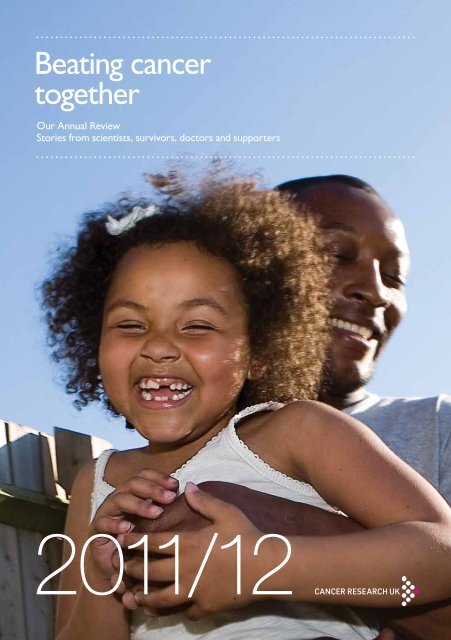
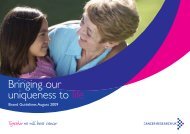
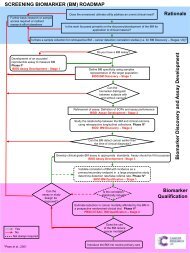
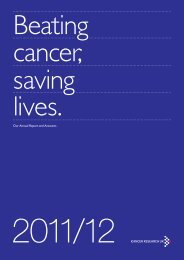
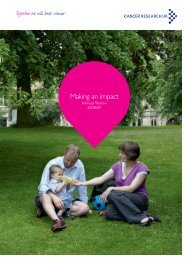
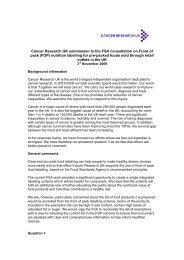
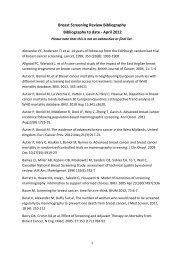
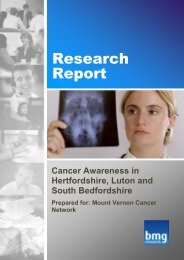
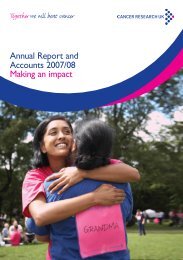
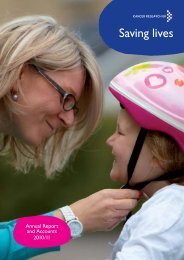
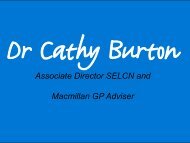
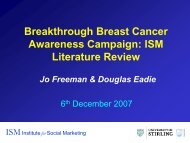
![[PDF] Cancer Research UK's strategy 2009 - 2014](https://img.yumpu.com/29239422/1/184x260/pdf-cancer-research-uks-strategy-2009-2014.jpg?quality=85)
